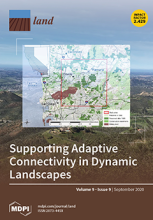/ library resources
Showing items 1 through 9 of 48.This study explores urbanization and flood events in the northern coast of Central Java with river basin as its unit of analysis. Two types of analysis were applied (i.e., spatial data and non-spatial data analysis) at four river basin areas in Central Java—Indonesia.
Mountainous regions are more sensitive to climatic condition changes and are susceptible to recent increases in temperature. Due to urbanization and land use/land cover (LULC) issues, Cameron Highlands has been impacted by rising land surface temperature (LST) variation.
The 2019 fire crisis in Amazonia dominated global news and triggered fundamental questions about the possible causes behind it. Here we performed an in-depth investigation of the drivers of active fire anomalies in the Brazilian Amazon biome.
With 15–20% of Indonesian oil palms located, without a legal basis and permits, within the forest zone (‘Kawasan hutan’), international concerns regarding deforestation affect the totality of Indonesian palm oil export.
The stabling of livestock farming implies changes in both local ecosystems (regeneration of forest stands via reduced grazing) and those located thousands of kilometers away (deforestation to produce grain for feeding livestock). Despite their importance, these externalities are poorly known.
Agricultural land resources have been the central issue for the Chinese government in its attempts to secure food and agricultural sustainability. Yet strict land use control does not protect the agricultural land from erosion by urban expansion.
This paper reviews the recent literature dealing with farmland protection (FP) policies in developed countries from a planning perspective, with a specific focus on the Mediterranean region. It provides coverage of French language papers that may have been omitted in previous reviews.
We investigated the spatial relations of ecological and social processes to point at how state policies, population density, migration dynamics, topography, and socio-economic values of ‘forest coffee’ together shaped forest cover changes since 1958 in southwest Ethiopia.
Papua New Guinea is a country in Oceania that hosts unique rain forests and forest ecosystems which are crucial for sequestering atmospheric carbon, conserving biodiversity, supporting the livelihood of indigenous people, and underpinning the timber market of the country.
Pagination
Land Library Search
Through our robust search engine, you can search for any item of the over 73,000 highly curated resources in the Land Library.
If you would like to find an overview of what is possible, feel free to peruse the Search Guide.





